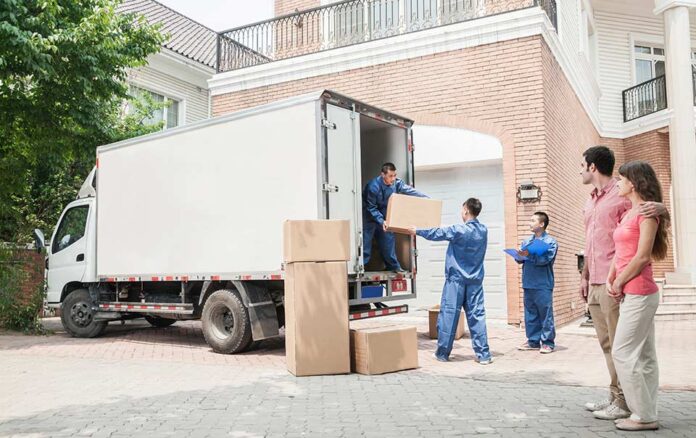Moving across the country can be an exciting yet expensive endeavor. However, with a little planning and some smart strategies, you can make your cross-country move more budget-friendly.
In this blog post, we’ll provide you with practical tips to help you save money on your move and settle into your new home without breaking the bank.
Plan Ahead and Create a Budget

One of the best ways to save money on a cross-country move is to start planning early. Begin by researching the average moving costs and create a detailed budget. Make a list of all the expenses involved, such as packing materials, truck rental, professional movers, and potential lodging and food expenses during the move.
This will help you identify areas where you can save money and avoid last-minute surprises.
Declutter and Downsize To Save Money

Before packing, take the time to declutter and downsize your belongings. Not only will this help you save on moving costs (since you’ll have fewer items to transport), but it will also make unpacking and settling into your new home much easier. Sell, donate, or recycle items you no longer need or use, and consider having a garage sale to make some extra cash.
Sort Your Belongings
The first step in decluttering and downsizing is to sort through your belongings and determine what you want to keep, donate, sell, or discard. Use the following categories to help you make decisions:
- Keep – Items you use regularly, have sentimental value, or are necessary for your daily life.
- Donate – Items that are in good condition but no longer serve a purpose for you. These can benefit others in need.
- Sell – Items that have value and are in good condition, but you no longer need or want.
- Discard – Broken, damaged, or worn-out items that are not suitable for donation or sale.
Use the One-Year Rule
A helpful guideline for decluttering is the one-year rule: If you haven’t used an item in the past year, it’s probably safe to let it go. This can be especially useful when sorting through clothing, kitchen gadgets, and other items that tend to accumulate over time.
Organize a Garage Sale or Online Sale
One of the most effective ways to downsize your belongings and make some extra cash is to hold a garage sale or sell items online through platforms like eBay, Facebook Marketplace, or Craigslist. Be sure to price items reasonably and advertise your sale well in advance to attract potential buyers.
Start Early and Stay Organized

Begin packing as soon as you know you’re moving. This gives you ample time to sort through your belongings and avoid the stress of last-minute packing. Create a packing schedule, designating specific days for packing each room or category of items. Stay organized by labeling boxes with their contents and the room they belong to in your new home.
Get Multiple Quotes From Companies
When hiring a professional moving company, it’s essential to shop around for the best deal. Request quotes from at least three different companies, compare their prices, and read customer reviews to ensure you’re getting the best service for your money.
Move During the Off-Peak Season

Timing is everything when it comes to moving, and choosing the right time to relocate can have a significant impact on the overall cost and experience. The demand for moving services tends to be higher during the summer months, weekends, and the beginning and end of the month.
If possible, plan your move during the off-peak season to take advantage of lower rates. Also, consider moving on a weekday to further reduce costs.
Off-Season Offers Greater Availability and Flexibility
During the peak season, movers’ schedules tend to fill up quickly, leaving you with limited options for scheduling your move. In the off-peak season, however, moving companies have more availability, giving you the flexibility to choose a moving date that best suits your needs.
This can be particularly beneficial if you have a tight timeline or need to coordinate your move with other events, such as starting a new job or enrolling your children in school.
Less Traffic and Better Weather Conditions
The off-peak season generally coincides with the colder months, which means less traffic on the roads. With fewer people moving and traveling, you’ll likely encounter fewer traffic jams and potential delays, resulting in a smoother and faster moving process.
Moreover, while winter weather can be unpredictable, it’s often easier to navigate than the sweltering heat of summer, making the moving experience more comfortable for you and your movers.
Packing By Yourself

Hiring professional packers can be costly, so consider packing and loading your belongings yourself. Ask friends and family for help, and make sure to start packing early to avoid feeling overwhelmed. Be sure to use sturdy boxes and appropriate packing materials to protect your belongings during transit.
Here are some tips that can help you pack:
- Use small boxes for heavy items, such as books or kitchen appliances, to make them easier to carry.
- Pack fragile items with extra care, using bubble wrap or packing paper to cushion them. Clearly label these boxes as “Fragile” and indicate which side should face up.
- Distribute weight evenly within boxes to prevent them from becoming unbalanced or tipping over.
- Fill empty spaces in boxes with packing paper or clothing to prevent items from shifting during transit.
Gather Packing Supplies
Collect packing materials well in advance to ensure you have everything you need. Here’s a list of essential packing supplies:
- Sturdy boxes of various sizes
- Packing tape
- Bubble wrap or packing paper
- Stretch wrap
- Permanent markers for labeling
- Scissors or box cutters
- Furniture pads or blankets
Use Free or Low-Cost Packing Materials

Rather than purchasing expensive packing materials, look for free or low-cost alternatives. Check with local retailers, like grocery or liquor stores, for boxes they no longer need. Use old newspapers, towels, or linens as padding instead of purchasing bubble wrap or packing peanuts.
Make a Moving Essentials Bag
Pack a bag with essentials you’ll need during the move, such as toiletries, clothes, important documents, and medications. This will help you avoid unnecessary expenses on the road and ensure you have everything you need at hand.
Prepare For Your Move Properly
A cross-country move doesn’t have to be a financial burden. With these budget-friendly tips, you can save money and make your move as stress-free as possible. Remember, planning ahead, comparing options, and being resourceful are key to a successful and cost-effective move.




